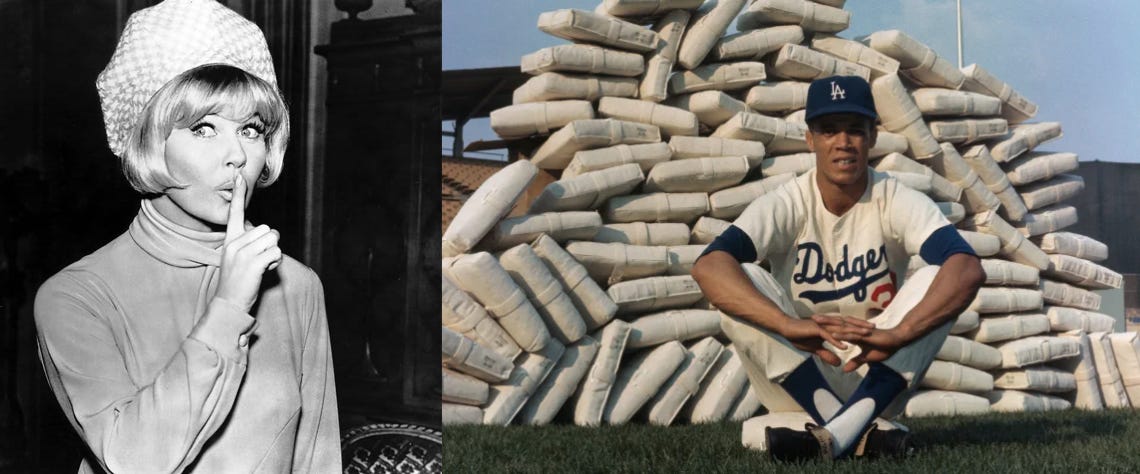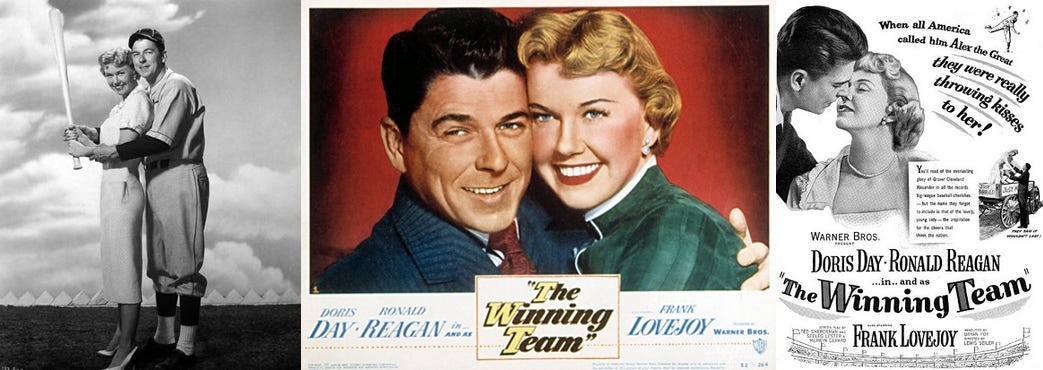Tinker Taylor Soler Spezio is nothing if not dedicated to rigorous reportage. Especially when it’s on a 60-year-old story.
And the last thing I want to do is slut-shame America’s sweetheart with sloppy reporting.
So… depending on whose account you cotton on to, Doris Day had an extra-marital relationship with Dodgers legend Maury Wills in the fall of 1962, right after he won the National League MVP.
This shocking and compelling story covers all our favorite topics here at TTSS: baseball rom-coms, statistical anomalies, double entendre, and banjo-playing ballplayer 7-inch singles. As such, these topic will be beaten to death over the next three newsletters.
Part One: Doris Day’s baseball movie trilogy.
Part Two: He said / She said. The affair.
Part Three: Maury Wills, stealer of bases & hearts, banjo man.
At the time of the alleged dalliance, Doris Day was Hollywood’s go-to actress for girl-next-door innocence, spot-on comedic timing, and a sweet singing voice. Starting out as a signer of pop ballads in the 1940s; she moved on to film musicals, comedy romps, and the occasional western or woman-in-peril drama in the 1950s; and became the #1 box office attraction in the 1960s.
She worked with Busby Berkeley, Michael Curtiz, Kirk Douglas, Lauren Bacall, Ronald Reagan, Ginger Rogers, Frank Sinatra, Jimmy Stewart, Clark Gable, Jack Lemmon, Rock Hudson, Cary Grant, James Garner, Richard Harris, and Alfred Hitchcock. Whew.

She loved animals, loved baseball, and most importantly (at least for today’s purposes), Doris Day starred in three baseball movies. Take that Costner. You might be saying, “That can’t be right. Those aren’t REAL baseball movies.” Well, you would be wrong.
Let’s lay out some Baseball Movie Criteria. Films must include:
A) The playing of a baseball game
B) Baseball players (real or fictional) with lines of dialog
C) Baseball as a pertinent plot element
Thems the rules. Let’s play ball.
If the word QUAINT became sentient and wrote an autobiography. And if the word NOSTALGIA became self-aware and built a robot who could direct movies. These two would pair up to make On Moonlight Bay (1951).
In watching this movie, our 2020s perspective is contextualizing a more innocent 1950’s point-of-view (when the film was made), which is framing an even more innocent 1917 era (when the movie is set). It’s a time capsule inside a time capsule.
Doris Day plays a Marjorie Winfield, a dirt-covered, baseball-loving tomboy. In the one baseball scene, she talks her way into a sandlot game, promptly bangs a triple (maybe double + an error), and then immediately steals home, Jackie Robinson style. Criteria A & B, check.
Her tom-boy persona is quickly benched in favor of the usual 1950s romantic plot. Her baseball skills do come back into play as she 1) wins a Kewpie Doll throwing baseballs at a county fair, 2) pelts the boys in her neighborhood with snowballs, and 3) gets her love interest’s attention with a well placed snowball strike to his back as he stomps away (after the 5th minor misunderstanding that could have easily been avoided with one sentence of truth).
When, at long last, Marjorie and her beau, Williams, get engaged upon his shipping out to WW I, her father says, “Why didn’t you stick to baseball?!” Criteria C!
Decidedly a baseball movie, On Moonlight Bay is also a Christmas movie, a musical, and a meditation on the nature of a corrupt capitalistic system.
When Marjorie’s father first meets William, they discuss his college major. Dad asks, “How about banking?”
William, “Frankly sir, I feel like every bank in the country should be blown up.”
<awkward beat>
Marjorie, “Tea?”
Williams continues, “Not literally. It’s just that every thinking person knows that banks are completely unproductive and unnecessary. Why, they’re parasites on society.” He borrows five dollar bill from stunned Dad (a bank president) and goes on, “This is the commodity in which the banks deal: money, the root of all evil. Suppose it were all destroyed?” William rips up the fiver. “Has anything really been lost? Is there any less clothing, less food, less love in the world now?”
A fair point, college boy.
Whether this is a dig at the “college elites” or a bit of common sense socialism, the screenwriter has wedged this exchange into a frothy musical, just five years after the McCarthy hearings on Un-American Activities targeted Hollywood “Communists.”
On any given day, you never know what you’ll see at the ol’ ballpark/ cinema.
The Winning Team (1952) starts with a slow dolly-in to a Cooperstown Hall of Fame plaque with Ronald Reagan’s face on it. This single shot tells the audience everything it needs to know: This is the story of Grover Cleveland Alexander, as played by Ronnie. He’s in the Baseball Hall of Fame and you’re going to see just how he got there. Now that’s how you start a biopic.
The script provides a ripe showcase for Reagan, famously a Chicago Cubs radio announcer before becoming an actor. Years later he expressed reservations about the film, noting that Warner Bros' insistence that the word EPILEPSY never be spoken confused audiences. As with most biographical films, Alexander’s real life story is much darker than The Winning Team presents. He suffered from epilepsy and alcoholism, but preferred being known as a drunk, keeping his medical condition secret.
Doris Day holds her own as Aimee Alexander in a rare dramatic role. Unable to resist a little musical number, the producers have her sing the first couple lines of “Take me out to the Ballgame” (about 19 minutes in, if you’re impatient) and “Ol’ Saint Nicholas” in a brief Christmas scene. We’re 2-for-2 on Doris Day baseball Christmas movies!
Back to the baseball. The entire 25-minute third act recaps the 1926 World Series, when the Cardinals upset the loaded New York Yankees behind Alexander’s pitching gems in games 2 and 6. In game 7, Alexander cemented his legendary status with a bases loaded strikeout in relief and two scoreless innings to secure the series. When Doris Day appears in the stands for the last out of the ninth, I’m not gonna lie, I got a little misty.
The big climax of the film.
Doris Day and Ronald Reagan dramatic embrace.
The mixture of Reagan pitching in front of rear-projection and archival footage from real games is legitimately great (Criteria A, B, C met, in spades). The glimpses of Babe Ruth and other players are a fun bonus.
Baseball players playing themselves in The Winning Team earned their spots on the big screen with mostly stellar 1951 seasons. This is a solid line-up for any movie.
In That Touch of Mink (1962), Doris Day is a modern, if unemployed, gal in Manhattan. She meets-cute the 1962 equivalent of Steve Cohen in Carey Grant, right down to his ownership of a New York baseball team. Day has the anti-Midas-Touch — everything she encounters becomes a disaster. In an effort to impress her, Grant takes Day to sit in the dugout during a Yankees game. She argues a ball-strike call, which gets Mickey Mantle, Roger Maris, and Yogi Berra quickly thrown out of the game.
Let’s rank the ballplayers’ line delivery, shall we?
BEST: Maris, “It could have missed the corner.”
MEH: Mantle, “It looked like it.”
BAD: Berra, “It’s a perfect strike. The ump was right.”
Maris feels like a natural and delivers a believable frustrated reaction. Mantle doesn’t get much to work with. Berra has to feign sarcasm and fails badly. Surprising, as he has so many famously un-ironic ironic quips.
After the game, Day’s character exclaims, “I didn’t mean to get those men thrown out of the game… I always get that way at ball games. I just lose control.” Indeed.
With one iconic/goofy scene— baseball superstars delivering lines with movie superstars, during a game (all while establishing Day’s main character trait)— Touch of Mink is 100% a baseball movie.

Two quick baseball honorable mentions. In the Doris Day western musical Calamity Jane (1953), baseball gets a shout-out in the song “Windy City.”
I heard claim hundreds came
To a thing they call a base ball game
Cigar stores, revolving doors
They've got new inventions coming
'Stead of outdoor… indoor plumbing!
In The Pajama Game (1957), Doris watches softball game at a company picnic, but she is quickly distracted by a knife throwing charlatan. I wasn’t really watching this one that closely.
How does Doris Day’s baseball movie threesome rank in the baseball movie thrilogy pantheon? Kevin Costner’s three outshine all others. Clearly. Even the Bad News Bears baseball trilogy beats our Doris trio. Sorry, Doris, Kelly Leak rulz.
But if “Baseball Annie” Savoy from Bull Durham is your jam, you’ll do no worse than bingeing this Doris Day marathon.
It’s impossible not to love Doris Day, the performer, the singer, the persona. She charmed. She glowed. She made the otherwise unwatchable watchable. And she loved baseball. We’ll explore just how much, in the next Tinker Taylor Soler Spezio!










This is great writing. I can’t wait to read the next two!
The amount of work you put into this piece is amazing- great read!
We don't know much of Peanuts Lowrey these days.